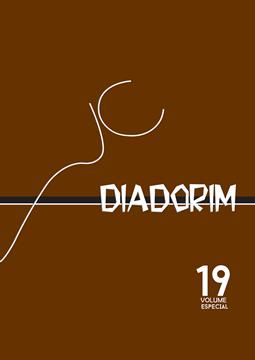Nump and Possp in Dialectal Brazilian Portuguese
DOI:
https://doi.org/10.35520/diadorim.2017.v19n0a13578Abstract
In standard Brazilian Portuguese (BP), as well as in other Romance languages, possessives have uninterpretable number features, which are valued via nominal agreement. However, dialects of BP, especially the one spoken in Minas Gerais, have shown that 2nd person possessives, in postnominal position, do not have number agreement with the noun. In order to account for these facts, I will argue that, in this grammar, number features on 2nd person possessives are reanalyzed as being: (i) associated with the person (rather than the noun) and (ii) valued. From the frst postulation, ‘seu' is expected to be the possessive for 2nd person singular, and ‘seus' for 2nd person plural. From the second postulation, no number concord is expected to be triggered on the possessive. In addition, based on Danon (2011) and Norris (2014), I will argue that cardinals divide BP DPs into two domains in that phrases located above NumP are marked with the plural morpheme, while phrases below it are unmarked. In this sense, because prenominal possessives precede cardinals (NumP), they must be marked with the plural morpheme for nominal agreement; whereas postnominal possessives, which follow NumP, must be unmarked. Free from the plural marking associated with nominal agreement, postnominal 2nd person possessives favor the reanalysis of the morpheme ‘-s' as indicating the number associated with person features.Downloads
Published
Issue
Section
License
Copyright transfer -- Authorization to publication
If the submitted article is approved for publication, it is already agreed that the author authorizes UFRJ to reproduce it and publish it in Diadorim: revista de estudos linguísticos e literários, the terms "reproduction" and "publication" being understood as defined respectively by items VI and I of article 5 of Law 9610/98. The article can be accessed both by the World Wide Web (WWW) and by the printed version, with free consultation and reproduction of a copy of the article for the own use of those who consult. This authorization of publication is not limited in time, and UFRJ is responsible for maintaining the identification of the author of the article.

The journal Diadorim: revista de estudos linguísticos e literários is licensed under a Creative Commons Attribuition-NonCommercial 4.0 International (CC BY-NC 4.0).

